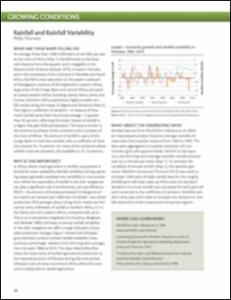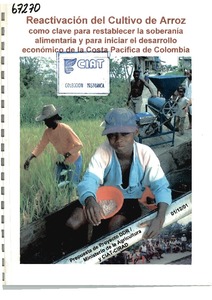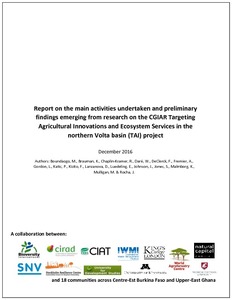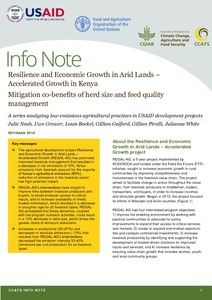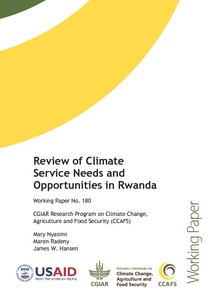Proceedings of the Workshop on Irrigation in West Africa: Current Status and a View to the Future, Ouagadougou, Burkina Faso, 1-2 December 2010
Rainfall and Rainfall Variability
In Africa, where most agriculture is rainfed, crop growth is limited by water availability. Rainfall variability during a growing season generally translates into variability in crop production. While the seasonality of rainfall in the drier rangelands can play a significant role in productivity, rain-use efficiency (RUE)—the amount of biomass produced (in kilograms of dry matter per hectare) per millimeter of rainfall—also drives production.
Reducing deforestation and enhancing sustainability in commodity supply chains: interactions between governance interventions and cattle certification in Brazil
A large number of governance interventions are being developed in order to reduce deforestation and enhance the sustainability of commodity
supply chains across the tropics. The extent to which individual agricultural commodity supply chain interventions can achieve scale, and
environmental or social objectives, depends in part on the ways in which those interventions interact with other interventions. We use a casestudy
of the new Sustainable Agriculture Network (SAN) cattle certification program in Brazil to explore the different ways in which governance
Reactivación del cultivo de arroz como clave para restablecer la soberanía alimentaria y para iniciar el desarrollo económico de la Costa Pacífica Colombiana
Reflexions on Agro-pastoralists in the WANA region: challenges and future priorities
Rangeland resources are among the most important – and almost certainly the most neglected – agro ecosystem component in dry areas. They are the largest land-use category, home to the poorest segment of the population, and crucial for millions of small-scale livestock producers. The availability of grazing resources for livestock in the world’s drylands is low and erratic due to the recurrent droughts in which animals can often fall victim.
Responding to global challenges in food, energy, environment and water: risks and options assessment for decision-making
We analyse the threats of global environmental change, as they relate to food security. First, we review three discourses: (i) ‘sustainable intensification’, or the increase of food supplies without compromising food producing inputs, such as soils and water; (ii) the ‘nexus’ that seeks to understand links across food, energy, environment and water systems; and (iii) ‘resilience thinking’ that focuses on how to ensure the critical capacities of food, energy and water systems are maintained in the presence of uncertainties and threats.
Report of the sixth meeting of the imGoats Inhassoro Innovation Platform (IP), Maimelane, Mozambique, 26 July 2012
Report on the main activities undertaken and preliminary findings emerging from research on the CGIAR Targeting Agricultural Innovations and Ecosystem Services in the northern Volta basin (TAI) project
The CGIAR Water, Land and Ecosystems research project on Targeting Agricultural Innovations and Ecosystem Services in the northern Volta basin (TAI) is a two year project (2014-2016) led by Bioversity International in collaboration with 11 institutes: CIAT, CIRAD, International Water Management Institute (IWMI), King’s College London (KCL), SNV World Burkina Faso (SNV), Stanford University, Stockholm Resilience Centre (SRC), University of Development Studies Ghana (UDS), University of Minnesota, University of Washington, and the World Agroforestry Institute.
Resilience and Economic Growth in Arid Lands - Accelerated Growth in Kenya: Mitigation co-benefits of herd size and feed quality management
The agricultural development project Resilience and Economic Growth in Arid Lands – Accelerated Growth (REGAL-AG) has promoted improved livestock management that resulted in a decrease in net emissions of 10%. Since emissions from livestock account for the majority of Kenya’s agricultural emissions (95%), reduction of emissions in the livestock sector has high potential impact.
Review of climate service needs and opportunities in Rwanda
Rwanda’s variable and changing climate is an increasingly serious challenge to the country’s
agricultural sector and farming population. Climate information services are emerging as a
means to support farmers to manage risk and provide an opportunity to build the resilience of
agriculture to climate at all time scales. Climate services include historical, monitored and
forecast information, and value-added information products such pest and disease risk
warnings, crop yield forecasts, or management advisories. The new Rwanda Climate Services


